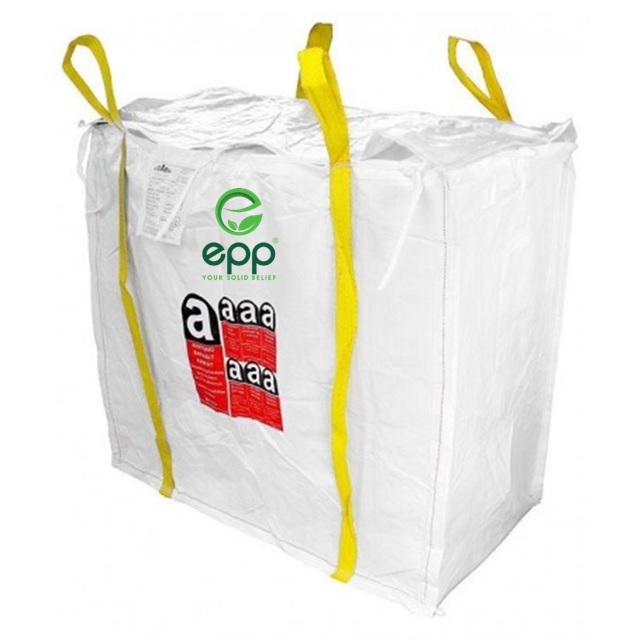Packing dehydrated bananas for export using FIBC Super Sack is a popular choice for many businesses today. This type of bag ensures that the product is not affected in terms of quality during transportation and handling. However, not everyone knows how to effectively pack dehydrated bananas for export using FIBC super sacks. That is why today, EPP Vietnam will provide you with information related to this issue.
Structure of FIBC Super Sack
FIBC super sack (Flexible Intermediate Bulk Container), also known as jumbo bags, are large-sized bags used for storing, storing, and transporting goods with a large load capacity ranging from 500kg to 2500kg.

Structure of FIBC Super Sack
The basic structure of FIBC bags includes:
Bag body:
-
Made from PP (Polypropylene) or PE (Polyethylene) woven fabrics with a weight ranging from 120gr/m2 to 250gr/m2 depending on the bag's load capacity and the nature of the contained product.
-
Can be coated or uncoated.
-
Available in various shapes such as square, round, U-panel.
Bag mouth:
-
Can be designed as a cover, filling spout, 3-sided open, or without a cover.
-
The bag mouth can be designed according to the product being contained and the packaging equipment.
Bag bottom:
-
Can be designed as a flat bottom, discharge spout, pijama (skirt), or fully open bottom.
-
The bag bottom can be designed according to the specific needs.
Lifting loops:
-
Usually designed with 4 U-shaped lifting loops.
-
Can be attached with 2 lifting straps.
-
The lifting loops make it easier to handle and unload FIBC bags.
Reasons to pack dehydrated bananas for export using FIBC Super Sack
There are several reasons to pack dehydrated bananas for export using FIBC bags:

Reasons to pack dehydrated bananas for export using FIBC Super Sack
Safety and good preservation:
-
FIBC bags are made from durable materials such as polypropylene (PP) or polyethylene (PE), which can withstand external environmental impacts and protect dehydrated bananas from dust, moisture, and other harmful factors.
-
FIBC bags are waterproof, helping to keep the dehydrated bananas dry and prevent mold and damage.
Cost savings:
-
FIBC bags are cheaper compared to other types of packaging such as cartons or plastic containers, helping businesses save packaging costs.
-
FIBC bags can be reused multiple times, reducing costs and protecting the environment.
Easy transportation:
-
FIBC bags are large-sized and can hold a significant amount of dehydrated bananas, saving space and transportation costs.
-
FIBC bags have lifting loops and lifting straps, making it easier to handle and unload the good
Environmentally friendly:
-
FIBC bags can be reused multiple times, minimizing waste and protecting the environment.
-
FIBC bags can be made from recycled materials, contributing to environmental protection.
Packing dehydrated bananas for export using FIBC Super Sack
Here is how to pack dehydrated bananas for export using FIBC bags:

Packing dehydrated bananas for export using FIBC Super Sack
Preparation:
-
Choose FIBC bags that are suitable in size and weight for the dehydrated bananas.
-
Use a PE liner to protect the bananas from moisture.
-
Use desiccant bags to keep the dehydrated bananas dry.
-
Use tying or drawstring to seal the bags.
Bagging process:
-
Line the FIBC bag with PE lining: The PE lining will help protect bananas from moisture and external factors.
-
Put the dried bananas in a bag: Carefully put the dried bananas into a FIBC bag lined with PE lining.
-
Add a desiccant bag: Put a desiccant bag in the bag to keep the dried bananas dry.
-
Seal the bag: Use string or drawstring to seal the FIBC bag.
-
Information notes: Note information about the product, including product name, weight, production date, expiration date, etc. onto the FIBC bag.
Note:
-
Choose FIBC bags with the appropriate size for the quantity of dehydrated bananas to be packed.
-
Use a PE liner with the appropriate thickness to protect the bananas from moisture.
-
Use an appropriate amount of desiccant bags to keep the dehydrated bananas dry.
-
Seal the FIBC bags carefully to avoid leakage.
-
Provide complete and accurate information on the FIBC bags.
Using FIBC Jumbo Bags to prevent riverbank erosion during flood season
Conclusion: The above is the method of packing dehydrated bananas for export using FIBC Super Sack. We hope that the information in this article will be helpful to you. For any further information, please contact us using the contact information provided at the end of the article.
🌐 Address: Central Lake 1 Building, Ecopark, Phung Cong Commune, Van Giang District, Hung Yen Province.
🌐 Website:https://epp.vn - https://eppvietnam.trustpass.alibaba.com
📲 +84 986 002 888 - sales@epp.vn

.jpg)
